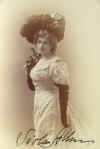











|
|
   |
Viola
Allan
(1867-1948)

|

|
|

|
|
"Miss
Allen acts mentally rather than
emotionally. Her conception of a part
is always intelligent, comprehensive,
and logical. One catches her meaning
instantly." Lewis C.
Strang |
|

|
|
Allen,
Viola (1867-1948) was the daughter
of American actors. This
"wide-eyed, round-faced, somewhat
sad –miened beauty" was born in
Huntsville, AL on October 27th, and
educated in Boston, Toronto and New
York. It was never her ambition to
become an actress, but when Annie
Russell became ill during the run
of Esmeralda at the Madsion
Square Theatre, where she was
playing the title role, Viola’s
father, C.
Leslie Allen who was a member of the
company, asked the stage manager, Mr.
William Seymour, if his daughter could
play the part. It was in this play,
part and theatre that Miss Allen made
her debut on July 4, 1882 at the age
of 15. Her performance attracted the
attention of John
McCullough, who engaged her to
play his daughter in Virginius.
He later made her his leading lady in
1884 where she appeared with him in
Othello and Richard III. In subsequent
season she played opposite W. E.
Sheridan, Lawrence
Barrett, and the
great Italian actor Tommaso
Salvini.
In 1889 she received much praise for
her Gertrude Ellingham in Shenandoah,
but a previous commitment forced her
to leave after five weeks to perform
in The Rivals and The Heir
at Law with Joseph Jefferson and
W.J. Florence, when they made their
joint starring tour. Her Lydia
Languish showed her as adept at comedy
as she was in tragedy and melodrama.
After an interval of playing modern
plays in New York productions, she
became leading lady with Charles
Frohman’s Empire Stock Company in
1893 and remained there for five
years. During this stint she created
the leading female parts in the
American productions of Liberty
Hall, The Younger Sons, The Councilor’s
Wife, Sowing the Wind, Gudgeons, The
Masqueraders, John-a-Dreams, The
Importance of Being Earnest, Michael
and His Lost Angel, A Woman’s
Reason, Marriage, Bohemia, The
Highwaymen, Under the Red Robe, A Man
and His Wife and The Conquers.
Viola might have continued with the
Empire had it not been for Elisabeth
Marbury who showed her Hall Craine’s
dramatization of his own novel The
Christian. Charles Frohman
dismissed it as trash and refused to
produce it. But Miss Allen felt it had
merit and in 1898 George C. Tyler
mounted it starring her as Glory
Quayle, the strong-headed, worldly
girl converted by her clergyman lover.
It was a huge success for Viola and it
became her most famous role. From then
on she received only "star"
billing. Between appearances in
contemporary plays such as Dolores in
Marion Crawford’s In the Palace
of the King (1900) and The
White Sister (1909), Roman in Hall Caine’s
The Eternal City (1902),
Mistress Betty in Clyde Fitch’s The
Toast of the Town (1905), she
successfully undertook the
Shakespearean parts of Viola (a role
for which she was highly regarded),
Hermione, Perdita, Imogen, and
Rosalind. During the 1915-1916 season
she toured as Lady Macbeth with
J.K.
Hackett. In March of 1916 she was
Mistress Quickly in The Merry Wives
of Windsor, her last New York
appearance. When another play in which
she was to star failed out of town she
retired. She died at the age of 81
having played none other than the
leading lady or the star role.
|
|

|
 |
 |
 |
| Portrait |
with
C. Leslie Allen (her father in real
life as well) in Esmeralda
(1882) |
Portrait |
 |
 |
 |
| Portrait |
Portrait |
Portrait |
 |
 |
 |
| Photo
with signature (1907) |
Twelfth
Night Poster |
tinted
Portrait |
 |
 |
 |
| as
Viola in Twelfth Night (1894) |
in
A Winter's Tale |
in
The White Sister
(1909) |
 |
 |
 |
| in
The Masqueraders (1894) |
in
School for Scandal |
in
Twelfth Night
Act I, Scene 2 |
 |
 |
 |
as
Viola in
Twelfth Night |
as
Imogen in Cymbeline |
Portrait |
 |
 |
 |
with
R.J. Dillon in
The Christian (1899) |
Portrait |
with
Robert T. Haines in The Palace of
the King |
 |
 |
 |
as
Gwendolyn in
The Importance of Being
Earnest (1895) |
as
Portia (1899) |
in
The Eternal City
(1902) |
 |
|
 |
with
James K. Hackett in Macbeth
(1915) |
|
as
Mistress Quickly in
The Merry Wives of Windsor
(1916) |
|

|
|
Joseph Haworth &
Viola Allen |
|
|

|
|
Top
of page |
|
|
|
 |